


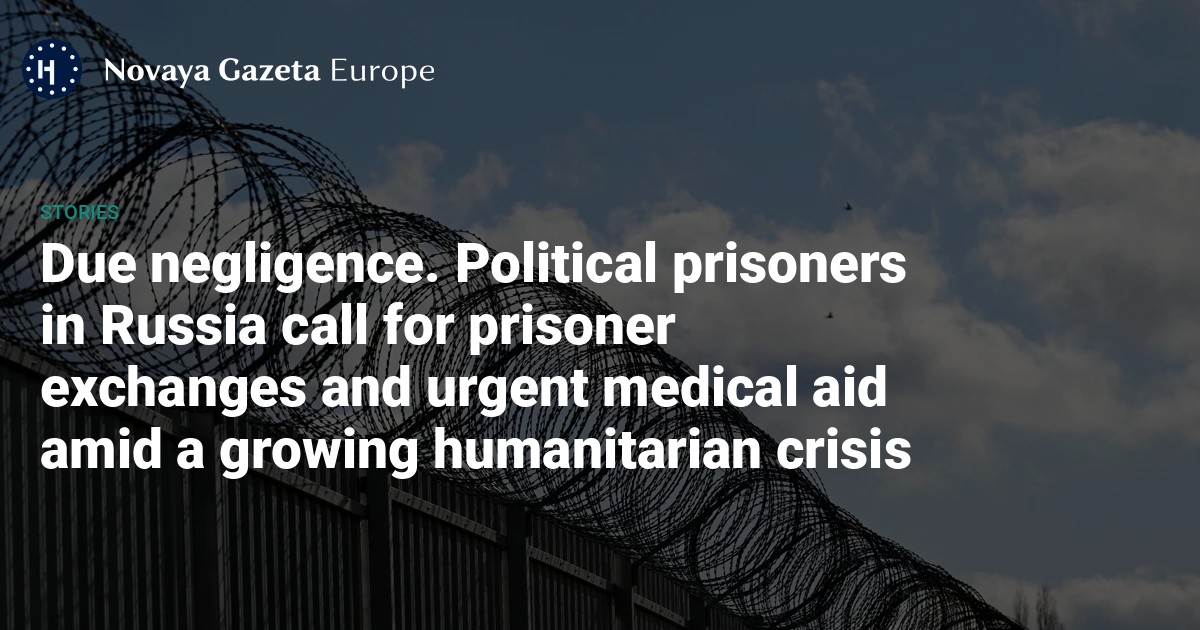
Russia’s prison system is teetering on the brink of collapse. Across the country, penal colonies and detention centres are facing severe shortages of medical personnel and basic medicines. Inmates’ pleas for medical help routinely fall on deaf ears.
On 3 July, Reuters published an open letter signed by eleven Russian political prisoners. In it, they call for a comprehensive “all-for-all” exchange of prisoners between Russia and Ukraine, and demand the immediate release of seriously ill political prisoners who are dying behind bars. Addressed to world leaders, the letter states that there are no fewer than 10,000 political prisoners and Ukrainian civilian hostages currently being held in Russia.
A data analysis conducted by the Russian research project To Be Precise suggests that approximately 50 of these individuals are unlikely to survive until the end of the year.
Since Russia’s full-scale invasion of Ukraine in February 2022, the country’s healthcare system has come under mounting pressure. Resources have been redirected to support the military, leading to growing shortages of doctors, medication and equipment — particularly in remote regions. These strains have hit prison healthcare especially hard.
In Russia, the right to medical care in prison is more than just a matter of human rights — it is a matter of survival. In a country where politically motivated prosecutions are common and arbitrary arrests not unusual, the state of prison healthcare can determine whether someone lives or dies.
Reports of death, torture, and the complete absence of treatment — particularly in cases involving political prisoners — are now routine.
Since 2022, medical provision in the facilities run by Russia’s Federal Penitentiary Service (FSIN) has deteriorated sharply. In a February report, human rights group OVD-Info documented a rise in deaths from cardiovascular disease, with prisoners dying while waiting for basic care.
These systemic failures have been exacerbated by wartime sanctions and Russia’s policy of phasing out imports, which have disrupted supplies of even the most essential medications — from antibiotics to insulin. Human rights groups report that people living with HIV, diabetes and other chronic illnesses are suffering acutely due to this medical collapse.
According to legal NGO Zona Prava, FSIN’s healthcare infrastructure has been “effectively dismantled”. Medical assistance is either delayed or denied entirely. Reports of death, torture, and the complete absence of treatment — particularly in cases involving political prisoners — are now routine, according to human rights organisations such as Gulagu.net, OVD-Info and Memorial.
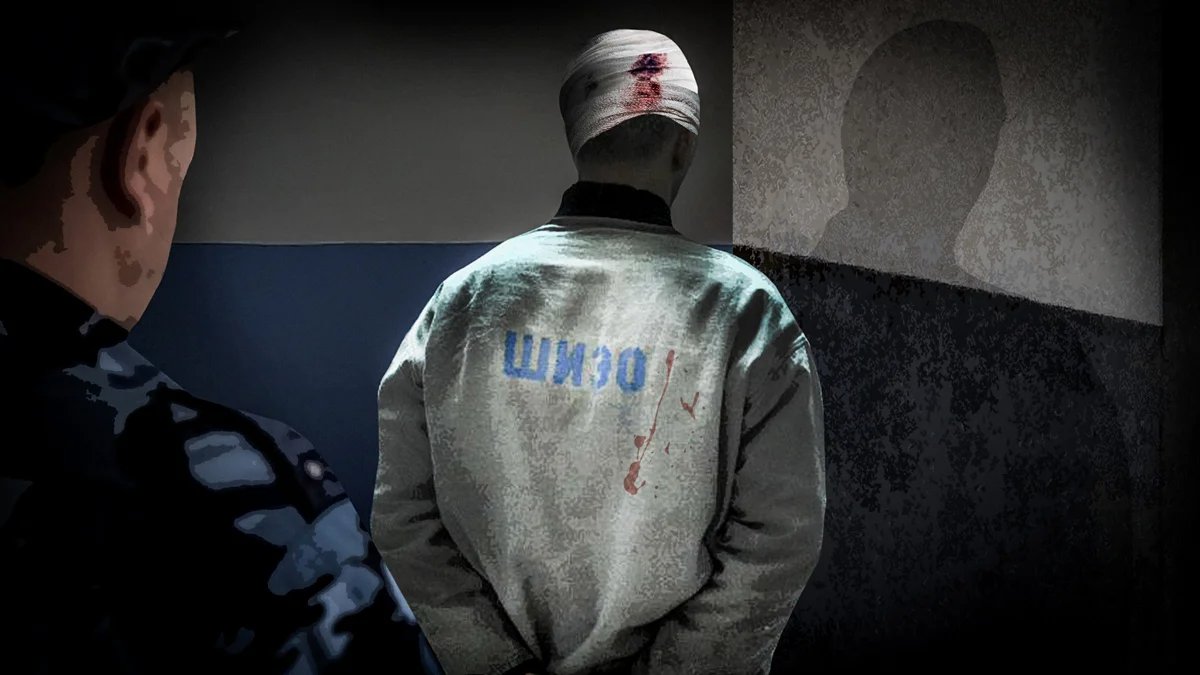
Illustration: Novaya Gazeta Europe
“Prison healthcare is dire for all inmates,” says Maria Nemova, a lawyer with OVD-Info’s Neotlozhka project, which supports political prisoners in urgent need of medical help. “But for political prisoners it can be even worse. The denial of medical care is sometimes used as a form of pressure or punishment.”
Ukrainian prisoners held in Russia face systematic torture, humiliation and routine denial of medical treatment. These are not isolated incidents but appear to stem from unofficial orders within FSIN’s leadership.
In 2023, FSIN stopped publishing key statistics such as the number of prisoners, rates of illness, and mortality. In its 2024 repression report, OVD-Info recorded at least 107 instances of physical or psychological abuse, denial of medical assistance, or intentionally harsh conditions inflicted on defendants in politically motivated cases. The report also documented at least 28 cases where political prisoners were denied medical care or received substandard treatment. Eight political prisoners — including opposition leader Alexey Navalny — died in custody or as a direct result of imprisonment in 2024.
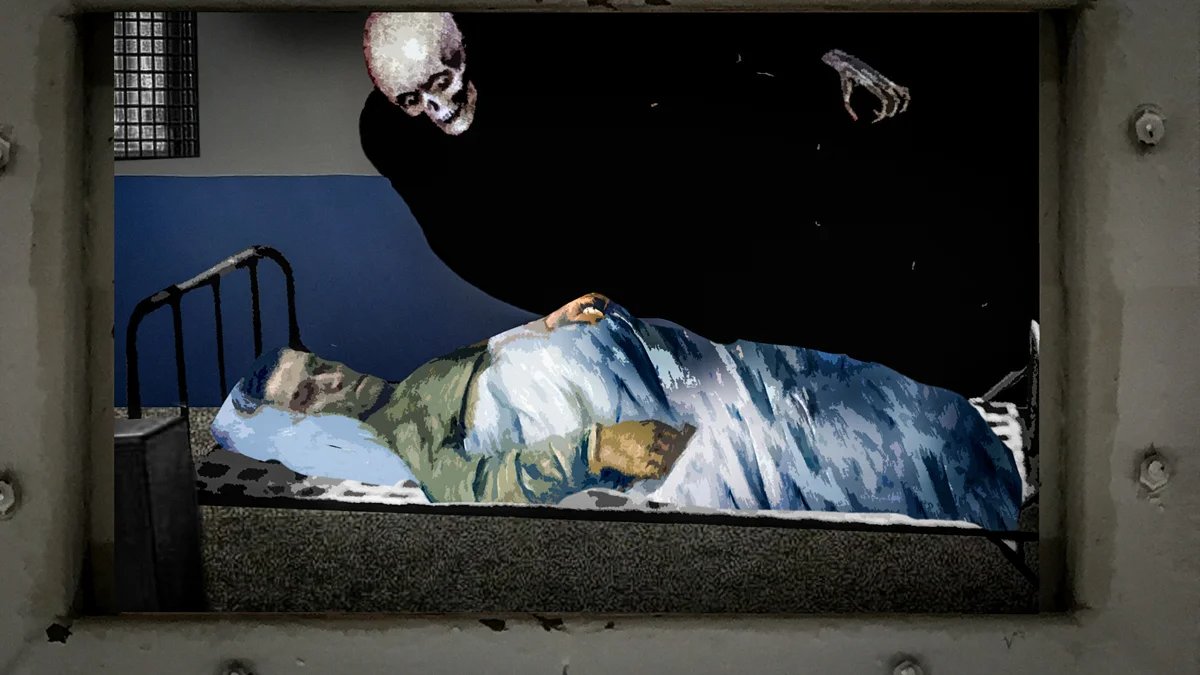
Illustration: Novaya Gazeta Europe
One example of the deliberate denial of medical care in prison is the case of Oleg Dmitriev, who was arrested in November 2017 and sentenced to eight years in prison in January 2019 for “preparing a terrorist act within a group” in what is believed to have been a setup by the Russian security services.
At the start of his prison term, Dmitriev broke his leg during an exercise walk. The fracture failed to heal properly, and although the bone eventually set, the damage to his ligaments left him unable to walk unaided. Surgery was required. After a prolonged legal battle, a court in Yekaterinburg ordered the colony to provide him with medical care — back in April 2022.
Yet, as of mid-2025, Dmitriev has still not undergone surgery. The lack of treatment has worsened his condition: now the entire joint needs to be replaced. He walks with a brace and cane, and his nights are disrupted by intense pain.
The prison administration only acts when the person is literally on the brink of death.
His co-defendants in the same case — Oleg Ivanov and Sergey Ozerov — are also in poor health. In 2021, Ivanov was diagnosed with a chronic shoulder fracture, likely sustained during his 2017 arrest. The colony had no surgeon, and Ivanov received no care. Human rights monitors recorded ongoing pain and swelling. Ozerov reportedly contracted tuberculosis while in prison.
“These cases are tragically typical,” says Nemova. “Especially when specialised treatment is needed. Anything more complex than ibuprofen, or anything requiring a specialist above the level of a paramedic is practically unavailable in penal colonies. In my experience, the prison administration only acts when the person is literally on the brink of death.”
Even when a political prisoner is finally taken to a hospital, the outcome is often disappointing. “We sometimes celebrate that someone got out to see a doctor — only to discover they weren’t treated at all. Then the whole process starts again,” Nemova continues.
For those without family, lawyers, or NGO support, the outlook is grim. “They’re left with nothing but sheer willpower,” Nemova says. “And any complaint risks retaliation, including harsher conditions.”
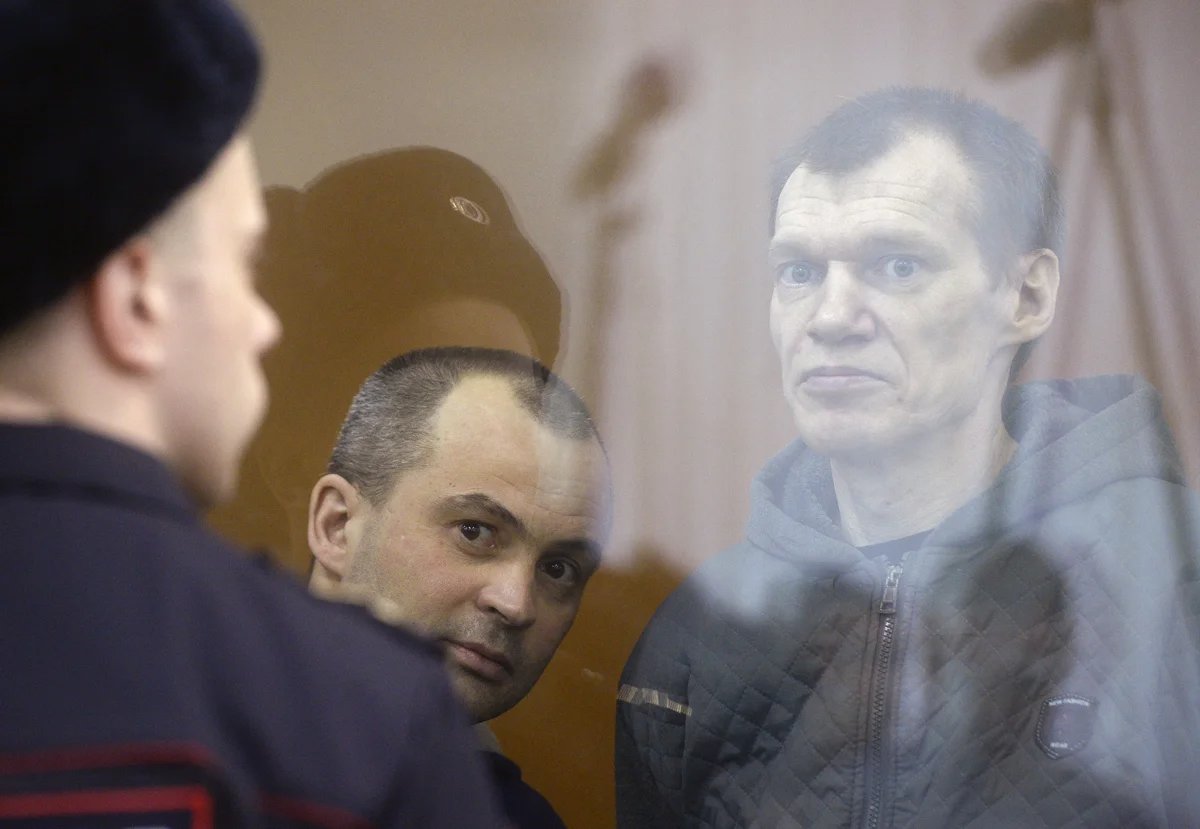
Oleg Dmitriev and Oleg Ivanov appear in court, Moscow, 22 January 2019. Photo: Emin Dzhafarov / Kommersant / Sipa USA / Vida Press
Since the 2022 invasion of Ukraine, the number of human rights organisations able to support prisoners in Russia has shrunk dramatically. The government has shut down some of the country’s most respected NGOs, including Memorial, the Moscow Helsinki Group and the Sakharov Centre. Independent lawyers and volunteers also face mounting pressure. Russia Behind Bars, a well-known foundation assisting inmates nationwide, has been forced underground.
Between 2022 and 2024, the number of organisations labelled “undesirable” by the Russian state more than tripled — from 53 to 189. Simultaneously, authorities have restricted access for prison monitoring bodies and civil society representatives.
Public monitoring commissions, which were established in 2008 as oversight bodies aimed to ensure prisoners’ rights, are now often staffed by ex-security officers, and instances of corruption have been documented. The result is an almost complete absence of independent oversight over Russia’s penal institutions. This makes the work of those who remain all the more vital.
Over 3,480 people in Russia are currently being prosecuted for political reasons, of whom at least 180 have reported health problems.
Neotlozhka, the OVD-Info project Nemova works with, provides critical support for political prisoners in medical distress. Since 2024, the team has successfully arranged treatment in at least 15 cases. Over 20 prisoners remain under their watch, all in need of urgent medical intervention. The project helps cover legal fees and treatment costs, and files complaints with international bodies such as the United Nations.
Paradoxically, Nemova notes that some legal reforms have moved in a more humane direction, even amid the general trend of repression.
“For example, changes were made to clarify that people with serious medical conditions from a government-approved list cannot be held in pretrial detention. It should have been obvious before, but now it’s formally codified. It’s a step forward — amid general backsliding.”
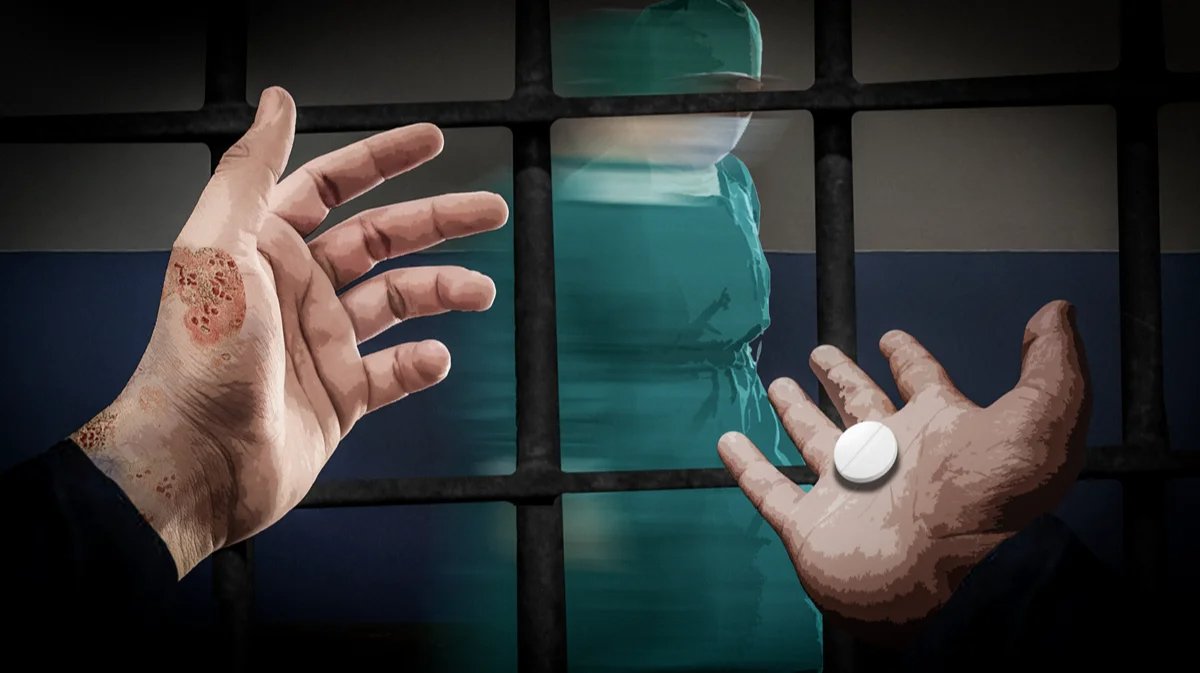
Illustration: Novaya Gazeta Europe
According to the Political Prisoner Support project, over 3,480 people in Russia are currently being prosecuted for political reasons, of whom at least 180 have reported health problems. Since 2022, there have been 73 documented cases in which political prisoners were denied access to medical care, diagnostic examinations, or vital medication.
The political prisoners’ open letter is not a cry of desperation. It is an act of resistance — a demand for justice and peace in a country where the state itself has become a threat to life.
Political prisoners are dying because the system no longer even tries to hide its cruelty.
Access to medical care is not a privilege. It is a fundamental human right. In today’s Russia, however, it has been turned into an instrument of coercion and torture.
Political prisoners are dying because the system no longer even tries to hide its cruelty. Their voices may be muffled behind bars, but those on the outside still have a choice: to hear them and act — or to look away.
The cost of silence is life itself. That is how pianist and political prisoner Pavel Kushnir died — unknown in life, and only recognised by the world after his death in a Russian pretrial detention centre.
The Russian government has banned independent media. We were forced to leave our country in order to keep doing our job, telling our readers about what is going on Russia, Ukraine and Europe.
We will continue fighting against warfare and dictatorship. We believe that freedom of speech is the most efficient antidote against tyranny. Support us financially to help us fight for peace and freedom.
By clicking the Support button, you agree to the processing of your personal data.
To cancel a regular donation, please write to [email protected]
VPNovaya
Help Russians and Belarusians Access the Truth
